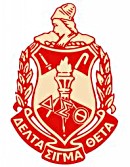
The Delta Mu chapter of Delta Sigma Theta was established at Maryland State College in 1952, but was later disbanded. A Nu Rho chapter in the community was in evidence in the late 1970’s, but the sorority currently has no formal undergraduate presence on the UMES campus.
Nevertheless, Deltas were known for engaging in such community service activities as volunteering to read to young children and organizing a jobs opportunity clinic. They also held various seminars, activities with local elementary school children, and an annual salute to the accomplishments of the black men on campus. They hosted social activities such as the Delta Ball, pool parties, exercise classes and the Delta Classic Party.
The sorority was founded Jan. 13, 1913 at Howard University by 22 former Alpha Kappa Alpha members. They broke away to pursue a service-oriented focus and to work on societal concerns of the day, such as women’s suffrage. Championing the principles of scholarship, service, learning and sisterhood, they also proclaimed a motto of “Intelligence is the Torch of Wisdom.” Delta Sigma Theta’s colors are crimson and cream, which represent courage and purity. Their flower, the purple and gold variety of the African violet, is a symbol of the sorority’s strong bond with Omega Psi Phi fraternity and symbolizes modesty.
Civil rights and activism:
Participating in the 1913 Women’s Suffragette March side-by-side with white women was one of the new sorority’s first acts. Scholarships, ranging from $100-to-$500, were given during the Great Depression to students, as well as financial support to many civil rights organizations. The 1930s also saw Delta Sigma Theta lobby the United States Government against racial injustice, especially in the case of the Scottsboro Boys (nine teenage boys accused of gang raping two white girls in Alabama). In that early Civil Rights activism, Deltas provided the bail for jailed protesters and helped pay the tuition and expenses of the students.
Projects/Programs
Deltas are credited with launching several social action programs, the most well known being the National Library Project initiated in 1937. Aiming to improve literacy and the quality of books, the sorority also created one of country’s first bookmobiles to reach isolated Southern communities. Betty Shabazz, the widow of Malcolm X, designed the Delta Academy for African American girls ages 11-to-14. Participants receive supplemental instruction in math, science and technology as well as leadership, service learning and relationship building. An offshoot of the Delta Academy is the Delta Growing and Empowering Myself Successfully, which works with at-risk African-American teenage girls. Nationally, Delta Sigma Theta aims to assist students in formulating a plan for college and career, while producing caring, and community-minded young women.
The American Heart Association’s “Go Red for Women” campaign is an ongoing initiative of the sorority because it focuses on raising awareness about cardiac health, healthy living choices and weight loss. In concert with this effort is its commitment to the 50 million pound challenge partnership for weight loss in the African American community. Other recent programs the sorority has supported include a Habitat for Humanity partnership, and raising international awareness of Kenya’s Mary Help of the Sick Mission Hospital. Delta sisters laid the groundwork for this first hospital of its kind, which offers affordable prenatal and postnatal care, nutritional education, child immunization, and family planning, while also serving as an educational training facility.
Financial Fortitude: Smart Women Finish Rich is another initiative. The Deltas also have expanded their activities by creating the EMBODI (Empowering Males to Build Opportunities for Developing Independence) program. Delta Days in the Nation’s Capital and at the United Nations are ways the sorority promotes political awareness. Delta Sigma Theta is also known for its annual “Jabberwock” social event, which dates to 1925 and generally combines cultural expression with talents to raise money for scholarships.
Members of Note:
- Osceola Macarthy Adams – a founding member of Delta, one of the first black actresses on Broadway
- Brig. Gen. Hazel Johnson Brown -the first African American female general in the U.S. Army
- Selma Burke – sculptor, fashioned a profile of President Franklin D. Roosevelt adapted for the United States dime.
- Shirley Chisholm – first black female member of the U.S. Congress, first African American and first woman to run as a major party presidential candidate
- Ruby Dee Davis – poet, stage, television and film actress
- Myrlie Evers-Williams – retired chairperson of the Board for the National Association for the Advancement of Colored People (NAACP)
- Shirley Jackson – 18th president of Rensselaer Polytechnic Institute, first African-American woman to become a commissioner of the U.S. Nuclear Regulatory Commission
- Barbara Jordan – first African-American to serve in Congress from the South since Reconstruction; first black to deliver a keynote address at the Democratic National Convention
- Jewel S. Lafontant – first American woman to be admitted into the International Academy of Trial Lawyers.
- Rae Lewis-Thornton -AIDS activist,received a 1996 Emmy award for her WBBM-TV’s (Chicago) ongoing series of first-person stories on living with AIDS.
— Frederick Douglass Library archives staff
Some information in his synopsis was drawn from the national sorority’s historical archives on its Web site.

